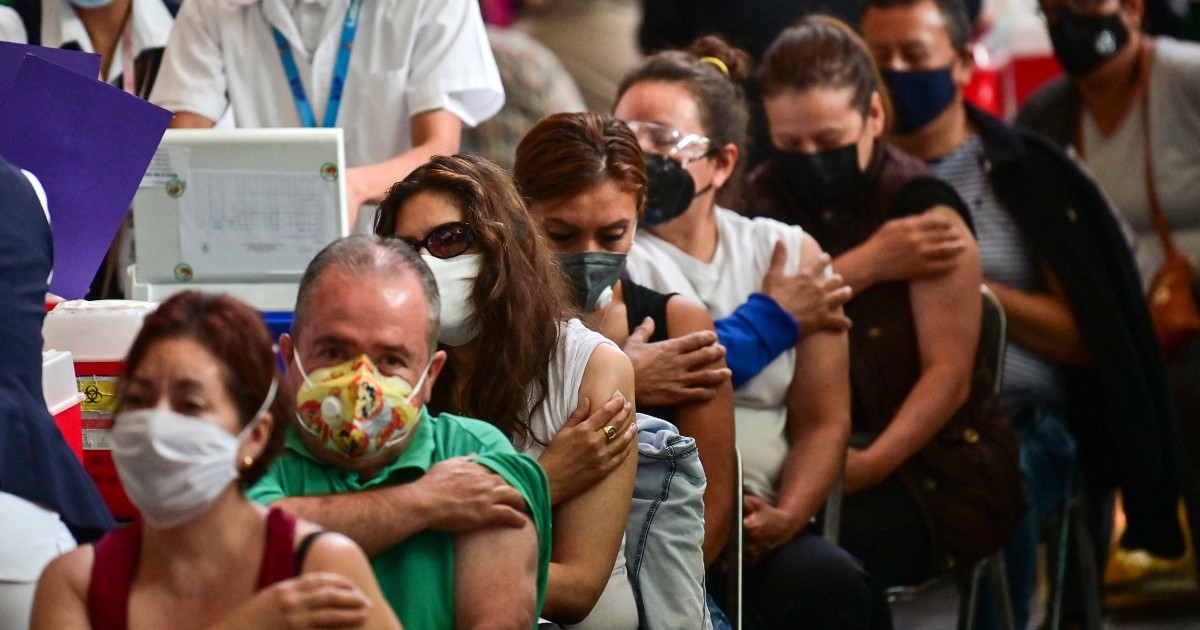
WASHINGTON — The White House said it will be sending out its first wave of 25 million doses of Covid-19 vaccines in the coming weeks as the administration looks to speed up efforts to assist countries struggling with a shortage of vaccines.
Of those doses, 19 million will be shared through the international aid organization COVAX, which will allocate 6 million doses to countries in South and Central America and the Caribbean, including Brazil and Haiti, which have been hit particularly hard. Another 7 million will go to Asian nations, including India, and 5 million will be sent to the African Union to allocate.
The U.S. will send another 6 million doses directly to governments that have requested doses, are experiencing surges or are immediate neighbors, including Mexico, Canada, Korea, the West Bank and Gaza, Ukraine, Kosovo, Haiti, Georgia, Egypt, Jordan, Iraq and Yemen. The U.S. will also provide vaccines to United Nations front-line workers.
The doses are the first to be shipped out of the 80 million President Joe Biden pledged last month to send overseas by the end of June. The White House did not give a timeline for when those doses would be shipped, saying only that the “specific vaccines and amounts will be determined and shared as the administration works through the logistical, regulatory and other parameters particular to each region and country.”
“To be clear, our approach is to ensure vaccines are delivered in a way that is equitable and follows the latest science of public health data across the coming weeks,” White House Covid-19 coordinator Jeffrey Zients said. “The administration will move as expeditiously as possible and work through regulatory requirements and logistical details to ensure safe and secure delivery of doses. It is certainly a complex operational challenge.”
Zients said 1 million doses would be heading to South Korea Thursday evening. Biden committed last month to give doses to South Korean service members who work directly with U.S. troops.
The U.S. has hit a number of hurdles in trying to get those vaccines out the door, from the logistics of rounding up extra doses and getting them on planes to making the difficult calculation of how many doses should go where.
Biden has committed to making sure every American is able to get vaccinated before sharing any doses with other countries, but with demand for the shots waning domestically and just over half of adults fully vaccinated, the U.S. has the excess supply. About 70 million doses of the Pfizer, Moderna and Johnson & Johnson vaccines have been shipped but are yet to be administered, and the clock is ticking on how long they can sit on shelves before reaching their expiration date, according to data from the Centers for Disease Control and Prevention.
Administration officials have said it is in the country’s national security interest to help in global vaccination efforts because the longer and more widely the coronavirus spreads, the more likely it will be to mutate into more infectious strains that could be resistant to vaccines.
The U.S. effort is also aimed at countering Russia and China, which have been sending their vaccines as a way to curry favor with other nations, administration officials have said. Biden has said the U.S. will not use the vaccine as a method of wielding influence.
“Our overarching aim is to get as many safe and effective vaccines to as many people as fast as possible. It’s as simple as that,” said national security adviser Jake Sullivan. “We want to save lives and thwart variants that place all of us at risk. But perhaps most important, this is just the right thing to do.”
The administration said the distribution of the doses is pending legal and regulatory approvals. Of the 80 million doses pledged so far, 60 million were to have come from AstraZeneca — but the administration said it won’t release those doses until the vaccine has been cleared by U.S. regulators, even though it has been approved for use in other countries.
The Food and Drug Administration review process has been delayed by issues with AstraZeneca’s study data, and it is unclear when — or even whether — AstraZeneca’s vaccine will get the green light.
The U.S. pledge of 80 million doses — while five times more than what any other country has committed — is a tiny fraction of the 1.8 billion shots the international aid group COVAX is aiming to distribute to lower- and middle-income countries this year.
Some House Democrats want the U.S. to do significantly more, and soon. Reps. Pramila Jayapal of Washington, Tom Malinowski of New Jersey, and Raja Krishnamoorthi of Illinois are circulating a letter to colleagues encouraging Biden to “take aggressive and immediate steps to ensure vaccines are quickly administered in countries around the world to mitigate COVID-19 globally.”
The letter, which was obtained by NBC News, calls for the immediate release of the 80 million doses, as well as a $25 billion investment “to oversee the production of 8 billion mRNA vaccine doses, sufficient to vaccinate half the world. This is one of the quickest ways to increase the immediate supply of vaccines globally.”
The letter also calls for the U.S. to convene “a global vaccine summit with world leaders — allies and adversaries alike — to spur cooperation and coordination in the development, production and distribution of vaccines, encouraging research transparency, open access, and global collaboration in engineering and manufacturing with a goal of accelerating universal vaccination”
The lawmakers contend the aggressive actions are in the country’s best interests because “from a public health perspective, if we are to defeat the virus, we cannot allow the continued surges globally because the virus knows no geographic boundaries and the public health of Americans is at risk.”
Thirty-nine lawmakers had co-signed the letter, which was first reported by CNN, by early Thursday evening.
Secretary of State Antony Blinken has said the 80-million-dose commitment will likely just be the start, as the U.S. aims to speed up efforts to vaccinate the rest of the world with the hope of being able to get 70 percent to 80 percent of the world vaccinated by the end of next year.
“We can speed this up. We’re going to speed this up,” Blinken said during remarks Wednesday in Costa Rica. “I think we have an opportunity to get this done by the end of next year, so stay tuned for that. It’s very, very important, and the president worked very hard on getting this plan together.”
Source: | This article originally belongs to Nbcnews.com









